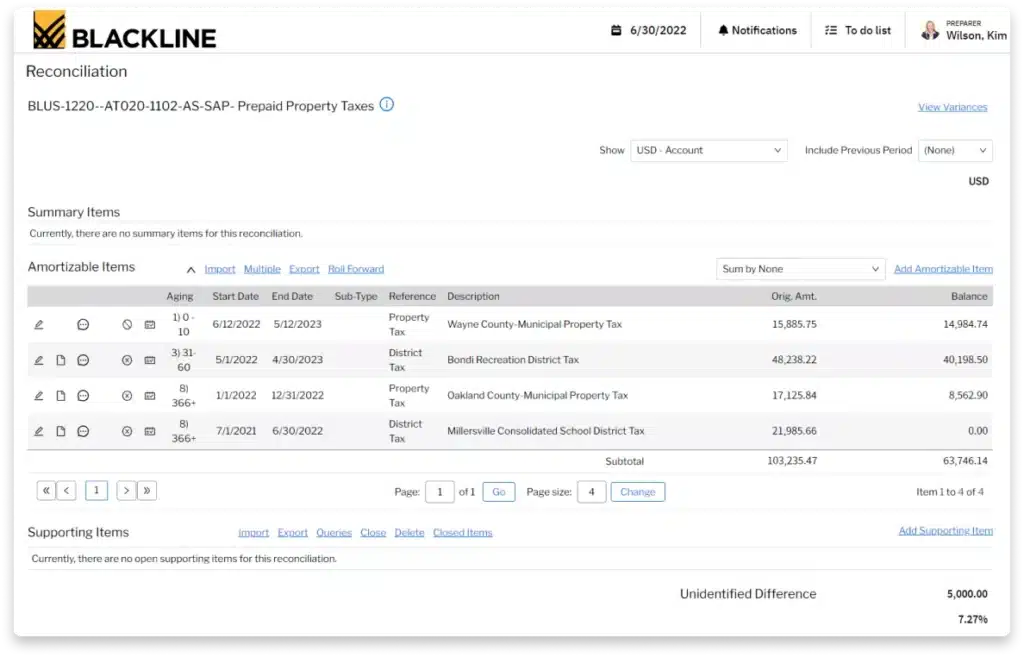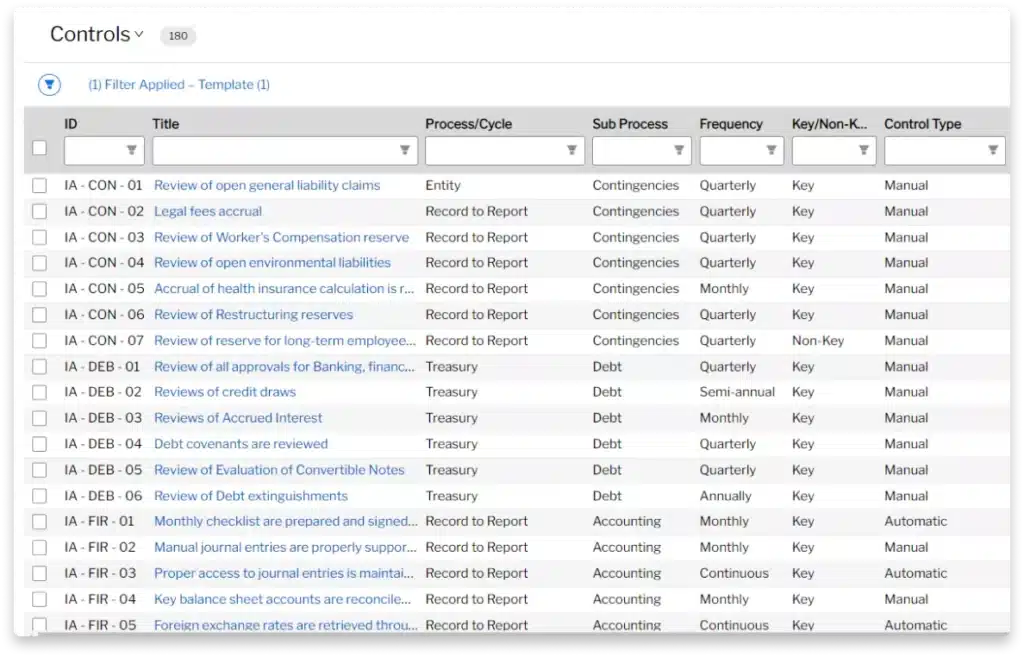In this review, I’m going to share my analysis and evaluation from my hands-on experience with BlackLine. But first, if you’re just beginning your search for the best accounting tools, check out my picks for the best accounting software. You probably already know that BlackLine is among the most popular accounting tools out there, but you need to better understand what’s good (and not so good) about it.
This in-depth BlackLine review will walk you through the tool's pros and cons, features and functionality, and more to help guide you to better understand its capabilities and its suitability for your needs.

BlackLine Product Overview
BlackLine provides financial automation tools focused on streamlining the close process. This platform primarily serves accounting and finance professionals across a range of large to mid-sized enterprises. Users benefit from reduced manual interventions and enhanced financial accuracy. BlackLine addresses the challenges of error-prone manual reconciliations and the time-consuming nature of financial reporting. Key features include continuous accounting capabilities, automated reconciliations, and task management.
Pros
- Automated Reconciliations: BlackLine boasts a system that automates account reconciliations, simplifying the process and ensuring more accurate financial statements.
- Continuous Accounting: This feature allows real-time data processing, meaning finance teams can work throughout the month rather than face month-end surges.
- Task Management: BlackLine offers a centralized dashboard for tracking and managing accounting tasks, ensuring timely completion and accountability.
Cons
- Learning Curve: BlackLine's comprehensive suite can be initially overwhelming for new users, requiring time for full acclimatization.
- Customization Limitations: While versatile, there are certain industry-specific requirements that BlackLine may not cater to out-of-the-box.
- Integration Challenges: Some users report occasional hiccups when integrating BlackLine with other enterprise software.
Expert Opinion
In my years observing and analyzing unified cloud platforms for finance and accounting automation, BlackLine stands out in many respects, but not without its set of challenges. Functionality-wise, its automated reconciliations and continuous accounting features are industry-leading. However, when considering the interface and integration aspects, it may fall short for some businesses with very specific or niche software requirements.
The onboarding process is straightforward, but mastery can take a while due to its robust offerings. Comparing it with other tools in the market, BlackLine often outperforms in scalability and reliability, but I've noticed it might slightly underperform in terms of immediate user-friendliness. In determining the ideal fit, I'd opine that BlackLine is particularly suited for larger enterprises with complex accounting needs rather than smaller businesses.
BlackLine: The Bottom Line
BlackLine distinguishes itself with its focus on continuous accounting – a paradigm shift that many competitors have yet to fully adopt. This approach, which promotes real-time financial processing, ensures that finance teams are not restricted to the traditional month-end close but can operate fluidly throughout the month.
Additionally, its task management dashboard is intuitive and centralizes critical accounting processes, making it easier for teams to stay on top of their tasks. This combination of features offers a notable advantage in today's dynamic accounting environment.
BlackLine Deep Dive
Explore the intricacies of BlackLine's features, integrations, pricing, and usability to understand its role in the financial automation ecosystem in this BlackLine review.

Product Specifications
- Automated Reconciliations - Yes
- Continuous Accounting - Yes
- Task Management Dashboard - Yes
- Real-time Data Processing - Yes
- Financial Close Management - Yes
- Transaction Matching - Yes
- Intercompany Hub - Yes
- Compliance Reporting - Yes
- Journal Entry Management - Yes
- Variance Analysis - Yes
- Audit Trail - Yes
- Customizable Reports - Yes
- Role-based Access Control - Yes
- Data Import/Export - Yes
- Multi-currency Support - Yes
- Workflow Automation - Yes
- Financial Consolidation - No
- Forecasting and Budgeting - No
- Collaboration Tools - Yes
- Data Security Features - Yes
- API Integration - Yes
- Mobile Access - Yes
- Training and Support - Yes
- Dashboards and Analytics - Yes
- SaaS Deployment - Yes
Feature Overview
- Automated Reconciliations: Streamlines the reconciliation process by reducing manual intervention, ensuring timely and accurate financial statements.
- Continuous Accounting: Enables real-time financial processing, allowing tasks to be spread throughout the month rather than just at the close.
- Task Management Dashboard: Centralizes accounting tasks, making it easier for teams to track progress and ensure timely completion.
- Transaction Matching: Enhances financial accuracy by automatically matching transactions.
- Intercompany Hub: Streamlines intercompany transactions and eliminates manual reconciliations between subsidiaries.
- Compliance Reporting: Ensures that all financial processes are in line with regulatory requirements.
- Journal Entry Management: Provides transparency and control over the entire journal entry process.
- Variance Analysis: Identifies and explains the reasons behind any discrepancies in financial data.
- Audit Trail: Offers detailed records of all changes, adding a layer of transparency and security.
- Dashboards and Analytics: Delivers real-time insights into financial data and processes.
Standout Functionality
- Intercompany Hub: While other platforms may have transactional tools, BlackLine's Intercompany Hub uniquely streamlines communications and reconciliations between subsidiaries, reducing complexities often seen in multinational corporations.
- Continuous Accounting: While real-time processing is not uncommon, BlackLine's focus on continuous accounting allows for an even spread of financial tasks throughout the month, which is a shift from the traditional end-of-month rush.
- Automated Reconciliations: Many platforms offer some form of automation, but BlackLine's comprehensive approach to automating reconciliations is particularly refined and robust.
Integrations
BlackLine offers native integrations with major ERP systems like SAP, Oracle, and NetSuite. These integrations mean data flows seamlessly between platforms, reducing the need for manual data entry or reconciliations. BlackLine provides an API, allowing for custom integrations tailored to specific business needs. Additionally, there are several add-ons available that can extend the platform's capabilities, like advanced analytics tools or specialized reporting features.
Pricing
Pricing upon request.
Ease of Use
From my experience with BlackLine, its user interface is modern and intuitive. However, given the comprehensive suite of tools it provides, newcomers might face a bit of a learning curve. Onboarding is systematic, with resources provided to aid the process, but mastering the platform does take time. Once familiar, navigation is smooth and the organization of tools within the platform is logical.
Customer Support
I've found BlackLine's customer support to be responsive and knowledgeable. They offer a range of channels, including live chat, email, and phone support. Additionally, there's an extensive library of documentation, webinars, and tutorials. However, during peak times, there might be slight delays in response.
BlackLine Use Case
Who would be a good fit for BlackLine?
BlackLine shines in larger enterprises with complex accounting needs, especially those operating across multiple subsidiaries or internationally. The platform's unique features, like the Intercompany Hub, cater specifically to such complexities. Most loyal customers appreciate its robust reconciliation features and the continuous accounting model for customer success.
Who would be a bad fit for BlackLine?
Small to midsize businesses or startups with simpler accounting needs might find BlackLine overwhelming and more sophisticated than necessary. Businesses looking for a basic solution or those without the resources to fully utilize and integrate its suite of tools might feel it's not the best fit.
BlackLine FAQs
What is the main purpose of BlackLine?
BlackLine is a unified cloud platform focused on automating and streamlining financial and accounting processes.
Is BlackLine suitable for small businesses?
While BlackLine can serve a range of businesses, it is especially tailored for mid-sized to large enterprises with complex accounting needs.
How does BlackLine handle intercompany transactions?
BlackLine has an Intercompany Hub that streamlines and automates intercompany transactions and reconciliations.
Can I integrate BlackLine with my existing ERP system?
Yes, BlackLine offers native integrations with major ERP systems like SAP, Oracle, and NetSuite.
Is there a mobile version or app for BlackLine?
Yes, BlackLine offers mobile access, ensuring users, like account managers and product managers can manage tasks on the go for remote work.
How secure is my data with BlackLine?
BlackLine emphasizes data security with features like role-based access control, data encryption, and an extensive audit trail.
Does BlackLine offer any training or support for new users?
Yes, BlackLine provides training resources, documentation, and a dedicated support team to assist users.
How does BlackLine's continuous accounting work?
Continuous accounting in BlackLine allows for real-time financial processing, spreading tasks evenly throughout the month instead of just at month-end.
Alternatives to BlackLine
- NetSuite: Often chosen for its comprehensive ERP capabilities alongside financial automation.
- FloQast: Picked for its close management platform, streamlining month-end closes.
- Host Analytics: Favored for its strong emphasis on financial planning and analysis.
BlackLine Company Overview & History
BlackLine is an accounting software company specializing in automating and streamlining financial and accounting processes. Renowned enterprises globally use its platform. A public company, it's listed on the NASDAQ. BlackLine is headquartered in Los Angeles, California. Its board and advisors comprise seasoned professionals with deep industry insights creating a highly intellectual company culture.
The company’s mission is to continuously improve the quality, accuracy, and efficiency of financial operations. Since its inception in 2001, BlackLine has consistently innovated, leading to its current position as an industry leader.
Summary
BlackLine offers a robust cloud-based platform for financial automation, especially suited for larger enterprises with complex needs. With standout features like the Intercompany Hub and a continuous accounting model, it addresses many challenges faced in today's dynamic financial landscape.
While it may pose a learning curve for newcomers, its comprehensive tools and attentive support make it a worthwhile investment for many. I'd recommend potential end-to-end users to consider their specific needs and how BlackLine might address them.
